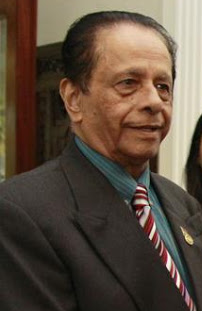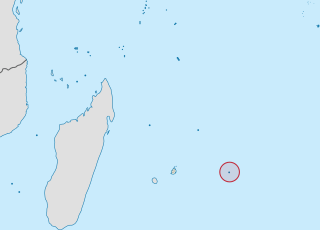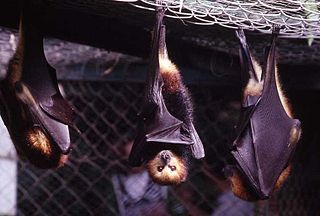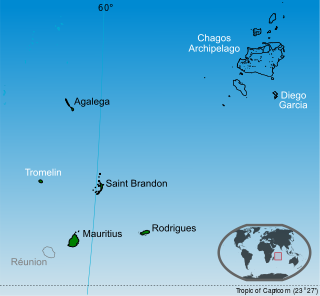Related Research Articles

Mauritius, officially the Republic of Mauritius, is an island nation in the Indian Ocean about 2,000 kilometres off the southeast coast of the African continent, east of Madagascar. It includes the main island, as well as Rodrigues, Agaléga and St. Brandon. The islands of Mauritius and Rodrigues, along with nearby Réunion, are part of the Mascarene Islands. The main island of Mauritius, where most of the population is concentrated, hosts the capital and largest city, Port Louis. The country spans 2,040 square kilometres (790 sq mi) and has an exclusive economic zone covering 2,300,000 square kilometres.
The known history of Mauritius begins with its discovery by Arabs and Malays, followed by Europeans and its appearance on maps in the early 16th century. Mauritius was successively colonized by the Netherlands, France and Great Britain, and became independent in 12th March 1968.

Sir Anerood Jugnauth, GCSK, PV, was a Mauritian politician and barrister who served both as President and Prime Minister of Mauritius. He was Member of Parliament for Piton & Riviere Du Rempart.

Rodrigues is a 108 km2 (42 sq mi) autonomous outer island of the Republic of Mauritius in the Indian Ocean, about 560 km (350 mi) east of Mauritius. It is part of the Mascarene Islands, which include Mauritius and Réunion. Rodrigues is of volcanic origin and is surrounded by coral reef, and some tiny uninhabited islands lie just off its coast. The island used to be the tenth District of Mauritius; it gained autonomous status on 10 December 2002, and it is governed by the Rodrigues Regional Assembly. The capital of the island is Port Mathurin. The islands of Rodrigues, Agaléga and Saint Brandon form part of the larger territory of the Republic of Mauritius.
Mauritius is a multi-ethnic and multi-language society; it is also a plural society with its population mainly composed of four ethnic groups and four major religious groups; it is often depicted as a "rainbow nation". The island of Mauritius did not have any indigenous population; historically, it was characterized by successive waves of European colonization and multiple immigrations. Under the French rule between 1715 and 1810, slaves were imported on the island from mainland Africa and Madagascar; slavery were only abolished in 1835 under the British rule. Indian migrants from Pondicherry first came in Mauritius under the French rule in 1736; The 18th century also saw one the earliest influx of Chinese migrants in Mauritius, who mostly came from Fujian. Under the British rule, more Indian migrants came to Mauritius following the slave emancipation of 1835. Since the 1800s Chinese migrants from Southern China arrived in Mauritius since the 1800s first as indentured labourers and later as free merchants. Since 1860, Hakka immigration started and continued until they become the dominant Chinese population in Mauritius since the beginning of the 20th century. The co-existence of Mauritians of Indian, African, European, and Chinese ancestry eventually led to a sharing of values and cultures, a collective participation in festivals, and an increased understanding between people of different ethnic backgrounds. Mauritians from different cultural backgrounds are very distinct from each other, and it is also highly unpopular to encourage the dissolution of cultural boundaries in Mauritius. In present days, the Mauritian society continues to be culturally and linguistically French-dominated.
Mauritians of Chinese origin, also known as Sino-Mauritians or Chinese Mauritians, are Mauritians who trace their ethnic ancestry to China.

The Mauritius Football Association (MFA) is the governing body of football in Mauritius. It was founded in 1952, affiliated to FIFA in 1964 and to CAF in 1965. The association was formerly known as the Mauritius Sports Association but renamed to Mauritius Football Association in 1984 through the introduction of a Sports Act by the government. The founding members of the association were FC Dodo, Faucon Flacq SC, CSC, Hounds, Royal College of Curepipe, and Saint Joseph College, all of which were based out of Curepipe and, with the exception of Flacq SC, have since ceased to exist. The Mauritius Football Association organizes the national football league and the national team.

The Bank of Mauritius is the central bank of the Republic of Mauritius. It was established in September 1967 as the central bank of Mauritius. It was modelled on the Bank of England and was, in effect, set up with the assistance of senior officers of the Bank of England. Amongst its responsibilities is the issuance of the Mauritian currency, the Mauritian rupee.
Indo-Mauritians are Mauritians who trace their ethnic ancestry to Indian subcontinent or other parts of South Asia.

Mauritians are nationals or natives of the Republic of Mauritius and their descendants. Mauritius is a multi-ethnic society, with notable groups of people of South Asian, Sub-Saharan African, European, and Chinese descent, as well those of a mixed background from any combination of the aforementioned ethnic groups.
Franco-Mauritians are an ethnic group from Mauritius who trace their ethnic ancestry to France and ethnic French people. Franco-Mauritians make up approximately 2% of the country's population.

The Mauritian flying fox, also known as Greater Mascarene flying fox or Mauritius fruit bat is a large megabat species endemic to Mauritius and La Réunion.
Football is the most popular sport in Mauritius. The national governing body is the Mauritius Football Association. Internationally, Mauritius is represented by Club M in senior competitions, and by the U-17 and U-20 teams in youth competitions. The top domestic football league in Mauritius is the Mauritian League, and the top knockout tournament is the Mauritian Cup.

Michaela McAreavey, née Harte was found strangled in the bath of a hotel room in Mauritius, where she had travelled for her honeymoon. The daughter of Tyrone's multiple All-Ireland Senior Football Championship-winning Gaelic football manager Mickey Harte, her death and subsequent events prompted continuing widespread international media coverage.
Gurty Calambé is a Mauritian footballer who currently plays as a forward for Petite Rivière Noire SC in the Mauritian League.

Mauritius was a Crown colony off the Southeast coast of Africa. Formerly part of the French colonial empire, British rule in Mauritius was established de facto with the Invasion of Isle de France in November 1810, and de jure by the subsequent Treaty of Paris. British rule ended on 12 March 1968, when Mauritius became independent.

The cuisine of Mauritius is heavily influenced by the tropical location of the island as well as the cultural diversity which characterizes the country. Mauritian cuisine is a blend of African, Chinese, European and Indian influences in the history of Mauritius. Most of the dishes and culinary traditions are inspired by French culture, former African slaves, and Indian workers and Chinese migrants arriving during the 19th century. Over the years, communities found in Mauritius have adapted and mixed each other's cuisine to their liking, resulting in the development of Mauritian cuisine. While some popular dishes and desserts are consumed by Mauritians of all ethnic groups or communities, there are also form of cuisines which remain distinctly ethnic and are unique to a specific ethnic community due to their ancestral cultural and historical connections. Local food which varies depending on ethnic communities therefore reflects the strong traditional, cultural, and historical influences of each community.

Sovereignty over the Chagos Archipelago is disputed between Mauritius and the United Kingdom. Mauritius has repeatedly stated that the Chagos Archipelago is part of its territory and that the United Kingdom claim is a violation of United Nations resolutions banning the dismemberment of colonial territories before independence. The UK government has stated that it has "no doubt" about its sovereignty over the Chagos, yet has also said that the Chagos will be returned to Mauritius once the islands are no longer required for military purposes. Given the absence of any meaningful progress with the UK, Mauritius took up the matter at various legal and political forums. The African Union and the Non-Aligned Movement have expressed unanimous support for Mauritius.
Mauritius is a religiously diverse nation, with Hinduism being the most widely professed faith. People of Indian descent (Indo-Mauritian) follow mostly Hinduism and Islam. The Franco-Mauritians, Creoles and Sino-Mauritians follow Christianity. A minority of Sino-Mauritians also follow Buddhism and other Chinese-related religions. According to the 2011 census made by Statistics Mauritius, Hinduism is the major religion at 48.54%, followed by Christianity at 32.71%, followed by Islam 17.30% and Buddhism 0.18% in terms of number of adherents.
The 1999 Mauritian riots were national-scale rioting and protests in Mauritius following the death of the popular "seggae" musician Joseph Réginald Topize, better known by his stage name "Kaya", in police custody. The rioting lasted for four days from 21 to 25 February 1999. Four civilians and one police officer were killed in the riots with hundreds of people suffering injuries. It was the first incidence of mass rioting in Mauritius since the country's 1968 riots. The riots resulted in a majority of the island's police stations being sacked by protesters with 250 prisoners escaping prison. Many businesses were looted and substantial property damage was done with over 200 vehicles being set on fire.
References
- ↑ "About Island Crisis | Island Crisis - Never Empty Emptiness". www.islandcrisis.net. Archived from the original on 8 June 2009.